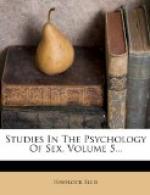by extreme excitement, culminating in spontaneous
ejaculation. The younger the woman the greater
the transport he experienced. It is noteworthy
that in this, as possibly in all similar cases, there
was no sensory perversion and no morbid attraction
of taste or smell; he stated that the action of
his senses was suspended by his excitement, and
that he was quite unable to perceive the odor or
taste of the fluid. (Pelanda, “Pornopatice,”
Archivio di Psichiatria, facs. iii-iv,
1889, p. 356.) It is in the emotional symbolism
that the fascination lies and not in any sensory perversion.
Magnan records the spontaneous development of this sexual symbolism in a girl of 11, of good intellectual development but alcoholic heredity, who seduced a boy younger than herself to mutual masturbation, and on one occasion, lying on the ground and raising her clothes, asked him to urinate on her. (International Congress of Criminal Anthropology, 1889.) This case (except for the early age of the subject) illustrates sporadically occurring urolagnic symbolism in a woman, to whom such symbolism is fairly obvious on account of the close resemblance between the emission of urine and the ejaculation of semen in the man, and the fact that the same conduit serves for both fluids. (A urolagnic day-dream of this kind is recorded in the history of a lady contained in the third volume of these Studies, Appendix B, History VIII.) The natural and inevitable character of this symbolism is shown by the fact that among primitive peoples urine is sometimes supposed to possess the fertilizing virtues of semen. J.G. Frazer in his edition of Pausanias (vol. iv, p. 139) brings together various stories of women impregnated by urine. Hartland also (Legend of Perseus, vol. i, pp. 76, 92) records legends of women who were impregnated by accidentally or intentionally drinking urine.
The symbolic sexual significance of urolagnia has hitherto usually been confused with the fetichistic and mainly olfactory perversion by which the excretion itself becomes a source of sexual excitement. Long since Tardieu referred, under the name of “renifleurs,” to persons who were said to haunt the neighborhood of quiet passages, more especially in the neighborhood of theatres, and who when they perceived a woman emerge after urination, would hasten to excite themselves by the odor of the excretion. Possibly a fetichism of this kind existed in a case recorded by Belletrud and Mercier (Annales d’Hygiene Publique, June, 1904, p. 48). A weak-minded, timid youth, who was very sexual but not attractive to women, would watch for women who were about to urinate and immediately they had passed on would go and lick the spot they had moistened, at the same time masturbating. Such a fetichistic perversion is strictly analogous to the fetichism by which women’s handkerchiefs, aprons or underlinen become capable of affording sexual gratification.




